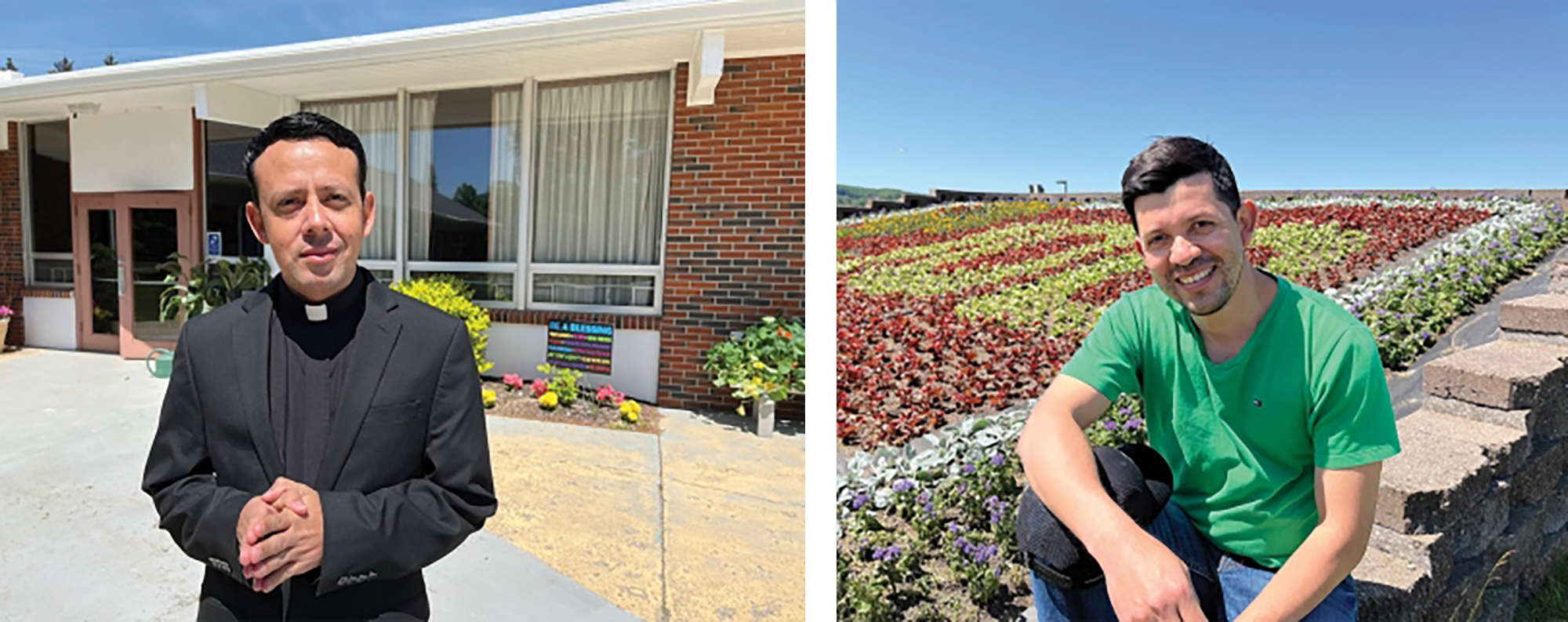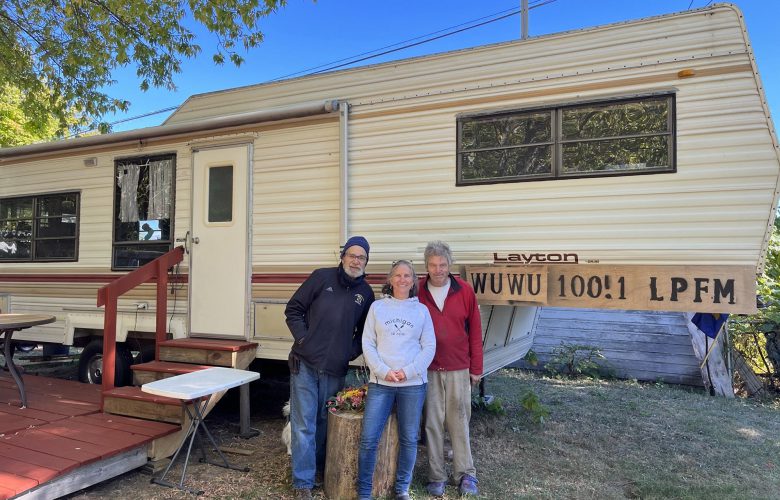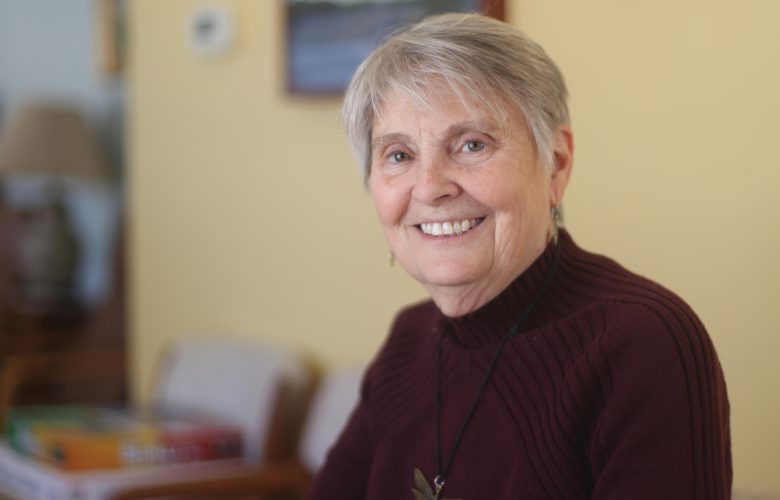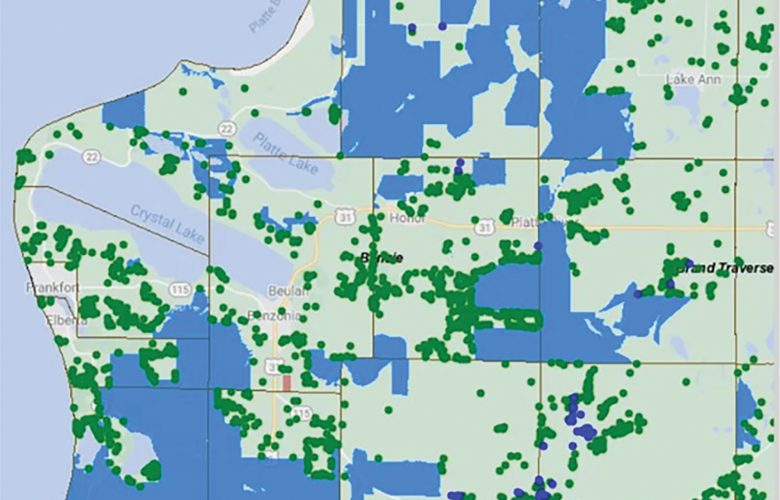Nicaraguan political prisoners take refuge in Empire
By Jacob Wheeler
Current Contributor
When Sergio Jose Cárdenas Flores (33) arrived at Cherry Capital Airport in Traverse City on a quiet winter day in early March, together with three other Nicaraguan political asylees, he looked about him and said, half-seriously, to Reverend Wayne Dziekan with the Diocese of Gaylord, “There’s no one here. Where are all the people?”
“Well, just wait; in a few months, there will be people everywhere,” chuckled Dziekan, who co-directs the Justice and Peace Advocacy Center, which helps asylees and migrant workers in Northern Michigan.
Now three months later, Cárdenas and priest José Luis Díaz Cruz are living in the rectory at St. Philip Neri Catholic Church in Empire. (Two other Nicaraguans—Manuel Antonio Obando Cortedano and Wilberto Artola Mejia—spent two months in Empire but now live in Mancelona.) The asylees see many more people in the small village than they did during the quiet month of March, and the congregation at St. Philip Neri has embraced them.
“We’re offering them a safe place to be,” says Reverend Ken Stachnik at St. Philip Neri. “Our parishioners are offering them meals and taking them to appointments. We’re trying to help them in any way we can—whether that’s learning English or getting them driver’s licenses. We’re following Father Wayne’s lead.
He continues:
“This is important, because it’s in the gospel. We are watching out for those who are lost and have no place to go. They’ve become part of our community. Our parishioners are happy to have them here.”
The asylees are grateful to have escaped Nicaragua, where the increasingly autocratic administration of five-term President Daniel Ortega has cracked down on dissent and persecuted the Roman Catholic Church, in particular.
Catholic clergy in Nicaragua have condemned the government’s violent suppression of protests that began in 2018 and called for democratic reforms since the 2021 general elections, which many deem as fraudulent, according to international news sources. The result has been increasing government hostility toward the Catholic Church, including the detention and prosecution of clergy members and escalating to the exile of other priests and Catholic organizations. Notably, about 90 percent of Nicaraguans identify as Christian, and more than half of those identify as Catholic; the Church also makes up a large portion of Nicaraguan civil society via social service institutions, such as schools, nursing homes, charities, and poverty-relief programs.
Cárdenas and Díaz, who are from the city of Matagalpa, were among dozens imprisoned for six months in the Nicaraguan capital city of Managua after living under house arrest in their church for two weeks last August. In February 2023, they were among 222 political prisoners flown to the United States after being forced to relinquish their Nicaraguan citizenship.
Cárdenas, who was a cameraman for the church in Matagalpa, and Díaz are now effectively stateless. They speak minimal English, and their daily lives in Northern Michigan are an exercise in patience, praying, and waiting.
Cárdenas’ wife and two-year-old daughter, Maryam Lucia, fled to Costa Rica, and await papers to join him in Empire. On most days, he bikes, visits the beach, and longs to hold his loved ones, who he has seen only once since the nightmare began—when they made a teary visit to his prison in Managua in early January.
Anti-Catholic Repression Increases
Since 2018, President Ortega and forces sympathetic to his regime have targeted religious institutions critical of his leadership, notably the Catholic Church, with harassment and persecution. The New York Times referred to Nicaragua’s Catholic priests as the “last independent voice in the Central American nation,” where nearly nine out of 10 citizens identify as Christian.
According to the United States Commission on International Religious Freedom (USCIAF), “the government has taken harsher measures against Catholic-affiliated organizations, such as shutting down charities and expelling their workers, stripping universities of funding and legal status, shutting down news media, and eliminating non-governmental organizations.”
Last June, a priest was sentenced to more than four years in prison on what the USCIAF called “spurious charges.”
Ortega won re-election in a landslide two years ago after jailing his opponents and disbanding their political parties. Since then, according to the United States Institute of Peace, “the regime has assaulted the Church as part of its campaign to consolidate power.”
Ortega was president of Nicaragua from 1985-1990, a period of nationalization and land reform, following the overthrow of the U.S.-backed, right-wing Somoza dictatorship. Ortega’s Sandinista movement suffered a full trade embargo imposed by the United States and attacks from U.S.-backed “Contra” rebels. Ortega lost the 1990 election, following alleged U.S. interference, but returned to power in 2006, having abandoned his leftist principles and now embracing an anti-democratic “strongman” approach, according to The Washington Post. His crackdowns on dissent have sent tens of thousands of Nicaraguans fleeing the country, to neighboring Costa Rica and to the United States.
Now, the government is targeting the Church—straight out of the playbook of autocratic regimes.
In August 2022, Nicaraguan police forcibly closed seven Catholic radio stations and detained several clergymen who had spoken out against Ortega. Rolando Álvarez, the bishop of Matagalpa, was detained for “organizing violent groups” and “carrying out acts of hate against the population.”
On August 4, 2022, Cárdenas and Díaz were among 12 people locked inside the church and deprived of access to food. They subsisted on the provisions they had, as well as an avocado tree on the church grounds. Then on August 19, at three in the morning, military police entered by scaffolding down ladders from the roof. The dozen detained individuals were forced to their knees until Bishop Álvarez arrived and surrendered to the authorities.
Cárdenas, Díaz, and others were blindfolded and taken by bus three hours to Managua, where they were placed in small cells and kept there until February 2023. Cárdenas and Luis Díaz were both charged with “conspiracy to undermine national integrity” and “propagation of false news” and were sentenced to 10 years in prison.
Exile Abroad
On February 9, Cárdenas, Díaz, and hundreds of other political prisoners were once again woken in the middle of the night and driven to the capital’s airport. Deprived of an opportunity to say goodbye to their loved ones, they were forced to sign papers, stripped of their Nicaraguan citizenship and exiled to the United States. They were flown first to Dulles Airport in Washington, D.C., then later to Miami. (Bishop Álvarez refused to leave Nicaragua; he has been sentenced to 26 years in prison.)
“Today, the United States welcomes 222 individuals who had been imprisoned by the government of Nicaragua for exercising their fundamental freedoms and have endured lengthy unjust detentions,” U.S. Secretary of State Antony Blinken said in a press statement on February 9. “Today’s development is the product of concerted American diplomacy, and we will continue to support the Nicaraguan people… The individuals released from Nicaraguan custody include political and business leaders, journalists, civil society representatives, and students.”
Cárdenas smiled when he recalled the mood aboard the airplane as they left Managua for what would be his first trip outside of Central America.
“We were joyful. We were singing. We were going to the United States. We were free,” he said. “But we were unable to call our families to say goodbye. We had no phones. We had only the clothes we wore in prison.”
Cárdenas and Díaz spent three days in Washington and nearly three weeks in Miami, which is home to nearly 120,000 Nicaraguans, the largest Central American community in Florida.
Sister Churches
When news broke on February 9 of the flight coming to the United States, Dziekan of the Gaylord Diocese learned that 10 from the church in Matagalpa were on the plane. Matagalpa and Gaylord are sister dioceses, and the priest figured he knew some of the asylees from his many visits to Nicaragua.
Dziekan contacted Bishop Jeffrey Walsh in Gaylord, who offered to sponsor and find housing for them in Northern Michigan. Six of the 10 had family or close contacts elsewhere in the United States or in Costa Rica; the other four came to Empire and Mancelona, where Dziekan has helped them with residency paperwork, dental and medical care, and immigration requests to bring their families here.
In Empire, Cárdenas waits for his wife and daughter to get State Department approval to leave Costa Rica and join him. They talk nearly every day on WhatsApp.
“She laughs, she’s walking now, she’s always happy,” Cárdenas says of his two-year-old daughter. “But she doesn’t understand the situation.”
Bit by bit, he is learning English.
“I can’t say much beyond ‘Hi, how are you? I’m fine. Where is the bathroom?’”
Cárdenas boasts a joyful, extroverted playfulness, and four-word conversations do not satisfy his need for human interaction.
“I miss my country, my family, the joy that I share in my place. It’s a small country, but it’s my country,” he says.
He continues:
“To the American people, I say ‘thank you.’ I can’t pay you back, but I can offer a prayer of thanks. My goal now is to continue forward. I don’t know where but to continue.”
A version of this article first published in the Glen Arbor Sun, a Leelanau County-based semi-sister publication to The Betsie Current.
Featured Photo Caption: Father José Luis Díaz Cruz (left) outside the rectory at St Philip Neri Catholic Church in Empire; Sergio Jose Cárdenas Flores (right) at Clinch Park in Traverse City. Photo courtesy of the Glen Arbor Sun.




